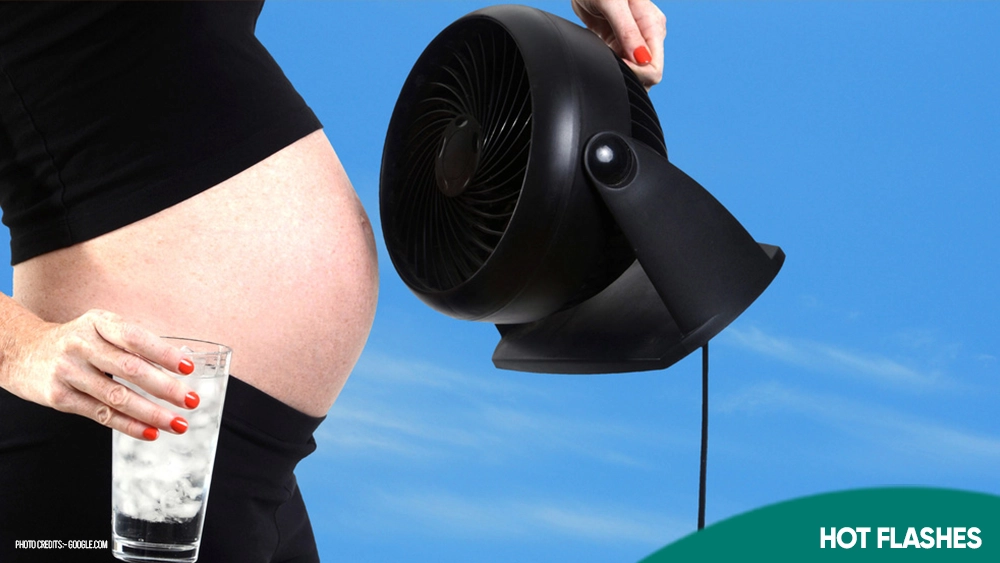
HEALTH BLOG
Hot Flashes During Pregnancy: Understanding the Causes, Symptoms, and Solutions
-
Rahul Priydarss
Hot flashes during pregnancy are a common symptom caused by hormonal changes, increased blood flow, and a heightened metabolic rate. These sudden waves of heat can occur as early as the first trimester and often intensify in the third trimester. Although uncomfortable, they are generally harmless. This article explains the causes, symptoms, and effective management strategies, such as staying hydrated, wearing breathable clothing, and practicing stress relief techniques. Learn how to reduce the discomfort of hot flashes and ensure a more comfortable pregnancy experience. Discover tips for handling hot flashes during pregnancy and postpartum.
Introduction to Hot Flashes During Pregnancy:
Hot flashes during pregnancy are a common occurrence caused by hormonal changes and increased blood flow, and although they can be uncomfortable, they are typically harmless. They’re often unexpected, occurring in brief waves of warmth that can make a pregnant woman feel flushed, overheated, and sometimes sweaty. While most people associate hot flashes with menopause, they are a frequent companion during pregnancy, starting as early as the first trimester and persisting for some women until postpartum.
The good news is that hot flashes during pregnancy are generally not dangerous. However, they can cause discomfort, especially when they happen frequently or at inconvenient times, such as during the night, leading to sleep disturbances. Understanding the reasons behind these hot flashes and learning how to manage them can make the pregnancy journey smoother and more comfortable.
In this comprehensive guide, we will explore why hot flashes happen during pregnancy, when they typically occur, how long they last, and what you can do to alleviate them. By the end, you’ll have a better understanding of how to manage this common pregnancy symptom and feel more at ease with your body’s natural processes.
What is Hot Flashes:
Hot flashes are sudden feelings of intense heat that spread across the body, often affecting the face, neck, and chest. They are typically accompanied by sweating, a rapid heartbeat, and sometimes a flushed appearance. Hot flashes can last from a few seconds to several minutes and are commonly associated with hormonal changes, particularly in women during menopause or pregnancy. The body’s temperature regulation is affected, causing these heat waves to occur unexpectedly. While uncomfortable, hot flashes are generally not dangerous and can be managed with lifestyle adjustments and, in some cases, medical treatments.

Table of Contents
What Causes Hot Flashes During Pregnancy:
Hot flashes during pregnancy are primarily triggered by hormonal fluctuations. Specifically, estrogen levels play a crucial role in regulating body temperature. During pregnancy, estrogen levels can fluctuate dramatically, causing the body’s internal thermostat, the hypothalamus, to become more sensitive. This heightened sensitivity can make even slight changes in temperature feel extreme, leading to sudden warmth or heat surges, which are commonly known as hot flashes.
Another factor contributing to hot flashes during pregnancy is the increased blood circulation that happens to support both the mother and the developing baby. Blood volume increases by up to 50% during pregnancy to ensure enough oxygen and nutrients reach the fetus. This increased circulation can make your body feel warmer, and your body compensates by triggering sweat to cool down.
Metabolic changes also contribute to hot flashes. Pregnancy increases your body’s metabolic rate as your body works harder to support your growing baby. This extra work generates more body heat, which can add to the sensation of hot flashes.
Emotional stress, a frequent companion during pregnancy, can also trigger hot flashes. Pregnancy is a time filled with physical and emotional changes, and the added anxiety or stress can exacerbate hot flashes. Stress triggers the body’s “fight or flight” response, which includes raising body temperature, potentially leading to a hot flash.
Lastly, changes in diet or dehydration can also bring on hot flashes. Pregnant women are often more sensitive to dietary factors, such as spicy foods or caffeine, both of which can elevate body temperature and cause or worsen hot flashes. Not drinking enough water can also make it harder for your body to regulate its internal temperature, which can trigger hot flashes.
When Do Hot Flashes Typically Start During Pregnancy:
Hot flashes can start at different stages of pregnancy for each woman, but many women report experiencing them in the first and third trimesters.
First Trimester:
In the first trimester, hormonal levels fluctuate significantly as the body adjusts to the pregnancy. Estrogen levels increase rapidly, which can result in early episodes of hot flashes. These hot flashes can catch many women off guard, as they are not typically expected so early in the pregnancy journey. During this time, the body is working hard to prepare the uterus for the growing baby, and these changes can throw off your internal temperature regulation, leading to a sudden heat surge.
Third Trimester:
In the third trimester, hot flashes often become more frequent or intense. By this time, the body is circulating more blood than ever to support the baby, and the weight of the baby can make it harder for your body to stay cool. Additionally, as the baby grows, your metabolism works overtime, which adds to the sensation of warmth.
Many women also experience postpartum hot flashes, especially while breastfeeding. Breastfeeding causes hormonal changes as well, particularly a drop in estrogen, which can continue to trigger hot flashes for several weeks or months after delivery.
How Long Do Hot Flashes Last During Pregnancy:
The duration and frequency of hot flashes can vary from woman to woman. Some women experience short, sporadic bursts of heat, while others may have longer, more frequent episodes that last for minutes at a time.
In general, hot flashes during pregnancy tend to occur more frequently in the evenings and nighttime, sometimes leading to night sweats. Night sweats can disrupt sleep and add to the discomfort. For some women, hot flashes happen daily, while others may only experience them occasionally.
After pregnancy, hot flashes may continue for several weeks, especially during the postpartum period as hormone levels adjust. For some women, they taper off after delivery, while for others, they may persist during the breastfeeding months due to lower estrogen levels.
Are Hot Flashes During Pregnancy Dangerous:
Hot flashes during pregnancy are typically not dangerous, but they can cause discomfort, especially if they occur frequently or at night, disrupting sleep. The sensation of sudden warmth and sweating can be irritating, but it does not usually pose any risk to you or your baby.
However, it is essential to monitor your body’s signals. If hot flashes are accompanied by dizziness, fainting, or extreme sweating, it could indicate that your body is struggling to regulate its temperature, and you should contact your healthcare provider.
In rare cases, persistent and severe hot flashes could be a sign of an underlying condition, such as a thyroid disorder or gestational hypertension. These conditions require medical attention, so if you experience any unusual symptoms along with hot flashes, it’s important to seek medical advice.

How to Manage Hot Flashes During Pregnancy:
Managing hot flashes during pregnancy is all about staying cool and reducing factors that may exacerbate the sensation of warmth. While hot flashes may be inevitable, there are several effective ways to ease the discomfort and prevent them from disrupting your day-to-day activities.
1. Stay Hydrated:
Drinking plenty of water throughout the day is one of the easiest and most effective ways to prevent hot flashes. Staying hydrated helps your body regulate its internal temperature and prevents overheating. Try to keep a bottle of water with you at all times, and aim to drink at least 8-10 glasses of water daily. If you experience night sweats, keeping a glass of water by your bed can be a quick fix for the overheating that occurs at night.
2. Wear Light, Breathable Clothing:
Choosing the right clothing can make a big difference when it comes to managing hot flashes. Opt for loose-fitting, breathable fabrics, like cotton, that allow air to circulate and prevent overheating. Avoid synthetic materials, such as polyester, which can trap heat against your skin.
Layering your clothing is also helpful, as you can remove layers when you feel a hot flash coming on and put them back on when you cool down. Dressing in light layers ensures that you’re prepared for sudden temperature changes throughout the day.
3. Cool Your Environment:
Keeping your living space cool can help reduce the occurrence of hot flashes. Use fans or air conditioning to maintain a comfortable temperature, especially in the bedroom at night. If you’re outside in hot weather, try to stay in the shade or carry a portable fan for quick relief.
For many women, night sweats are a significant issue, so using cooling bedding or keeping a fan near the bed can help you sleep more comfortably. Cooling gels or sprays can also be useful for instant relief during a hot flash.
4. Take Cool Showers:
A cool shower or bath can instantly lower your body temperature and provide relief from hot flashes. If you feel a hot flash coming on, taking a quick shower can help cool you down and reset your body’s internal thermostat. This is especially helpful before bed if you want to prevent night sweats.
5. Practice Relaxation Techniques:
Stress management is crucial for reducing hot flashes during pregnancy. Stress and anxiety can trigger hot flashes, so incorporating relaxation techniques into your daily routine may help. Techniques such as deep breathing exercises, prenatal yoga, or meditation can help reduce emotional triggers for hot flashes. By calming your mind, you can help calm your body as well.
6. Avoid Hot Flash Triggers:
Certain foods, drinks, and environments can trigger or worsen hot flashes. Try to avoid spicy foods, caffeine, and hot drinks that can elevate your body temperature. Similarly, exposure to hot environments or direct sunlight can increase the likelihood of hot flashes.
If you notice that specific activities or environmental factors trigger hot flashes, try to adjust your habits accordingly. For example, if a hot cup of coffee in the morning brings on a flash, switch to a cooler drink or have a fan nearby to counteract the effect.
When Should You See a Doctor About Hot Flashes During Pregnancy:
While hot flashes are usually a normal part of pregnancy, there are some situations where you should consult your healthcare provider.
- Persistent dizziness or fainting: If you feel lightheaded or faint when you experience hot flashes, it could indicate dehydration, low blood pressure, or another underlying issue.
- Heart palpitations: Rapid heartbeat or palpitations alongside hot flashes could be a sign of hormonal imbalance or a cardiovascular issue.
- Excessive sweating: While mild sweating is common with hot flashes, excessive or continuous sweating can indicate that your body is struggling to regulate its temperature.
If you experience any of these symptoms, or if your hot flashes are interfering with your daily life, it’s important to bring it up with your healthcare provider. They can rule out any other potential issues and give you personalized advice for managing your symptoms.
FAQs about Hot Flashes During Pregnancy:
A1: Hot flashes during pregnancy are caused by hormonal changes, increased blood flow, and a higher metabolic rate, making the body more sensitive to temperature fluctuations.
A2: Hot flashes can start as early as the first trimester and are more common during the third trimester due to increased blood flow and hormonal changes.
A3: No, hot flashes are usually not dangerous. However, if they are accompanied by dizziness or fainting, it’s important to consult a doctor.
A4: Stay hydrated, wear breathable clothing, keep your environment cool, and practice relaxation techniques to manage hot flashes effectively.
A5: Yes, some women experience hot flashes postpartum, especially while breastfeeding, due to hormonal adjustments. They usually taper off after a few weeks or months.

-Please remember, to always consult with healthcare professionals or Doctors for personalised advice related to medical conditions.
Conclusion:
Hot flashes during pregnancy are a common, albeit uncomfortable, symptom triggered by hormonal changes, increased blood flow, and emotional stress. While they can start as early as the first trimester and last into postpartum, they are usually not dangerous. By understanding the causes of hot flashes and implementing strategies to manage them, such as staying hydrated, dressing in breathable fabrics, and practicing stress relief, you can reduce their frequency and severity.




